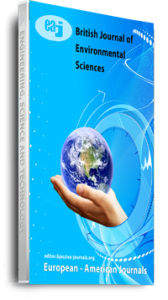The study examined the socio-economic characteristics of residents of Karu; identified the socio-economic influence of Abuja on Karu; examined the existing environmental infrastructure and practices in the study area and assessed the influence of Abuja on the sanitation behaviour of Karu residents. This was with a view to identifying the dimension of environmental sanitation problems facing the residents of the town.The data for the study were from both primary and secondary sources. Primary data were collected through questionnaire administered on the residents, users of markets’ and motor parks’ in the major settlements into which the study area was stratified. Samples from residents were selected systematically at an interval of every tenth building. Similarly systematic random sampling was used to select one out of every five operators’ (20%) permanent locations in motor parks and markets. A total of 230 households and 220 market and motor park users were sampled. Data obtained were analyzed using descriptive and inferential statistics. The results of the study revealed that 78.9% of the household heads were male. The educational status of the residents was on the decrease as distance of the settlement increased from the Federal Capital Territory (FCT) (x2 = 32.14; p = 0.003). Income of residents followed the same pattern as that of educational status (F = 347: p 0.009). It was also established that 83.5% of the sampled population were workers in Abuja confirming the spill-over effects of Abuja on Karu. The study further confirmed that 10.4% of the residents had waste storage containers in their homes. Similarly, the mostsignificant waste disposalmethods (74.8%) were dumping on vacant plots and buildings under construction. While 67.4% of the residents had pit toilet, 32.6% had water closet in their homes and only one of the three markets surveyed had toilet facilities. Waste water pit was only available in 7.4% of the residences. The study confirmed further that there was no waste collection service either by the Local government or private companies. A weak but statistically significant correlation of 0.346, (p = 0.05); 0.518 (p = 0.01); 0.332 (p = 0.05) were established between income and kitchen space, availability of toilet facilities and soakaway pit respectively. On the other hand, monthly income had a strong and significant correlation of 0.622 (p = 001) and 0.519 (p = 0.01) with occupation status and water system latrine respectively. The study concluded that the spill-over effect of the Federal Capital Territory (FCT) influenced the demographic, environmental, socio-economic and physical conditions of Karu. Furthermore, the lack of adequate provisions for water supply, waste storage and disposal facilities by Karu Local Government actually contributed to the environmental sanitation problems in Karu.
Citation: Saliman, Dauda (2021) A Study of the Problems of Environmental Sanitation of Karu, Nasarawa State, Nigeria, British Journal of Environmental Sciences, Vol.9, No.5, pp. 21-34
Keywords: Abuja, environmental sanitation, impact analysis, karu, spill-over effect

